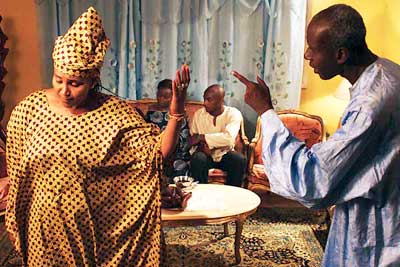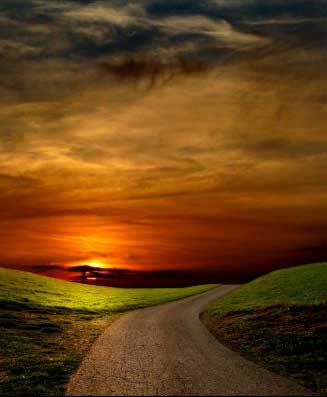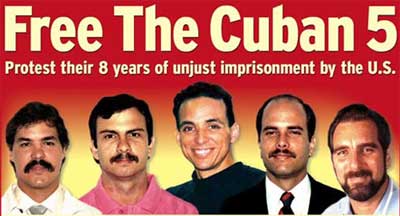 |
|
| • Everybody lies |
|
| • It is going to rain on Conakry |
|
| • A friend left us |
|
| • The five Cubans from Miami |
|
| |
|
| Everybody lies |
|
| |
|
A well-known television woman journalist has just published a book on lying. I did not have time to read it but a reporter from a weekly newspaper asked to interview us both on the subject. From the outset, the journalist declared: « I come to the evidence that everybody lies. »
The interviewer was glad with the effect caused by this statement: « A clergy cannot do otherwise than protest against such an assertion! » I answered: « The lie protects and makes it possible to outdistance a difficult situation.
In the Bible, Abraham, the father of the believers, lied to rescue his life. His wife Sara being very beautiful, he thought: When I enter into Egypt where I am forced to go because of the famine, they will take my wife and kill me. The only solution for me is to say that Sara is my sister. Not long ago, I was close to a dying person, a man of 50 years that I knew well. He was trying to tell me something important but he had lots of difficulty to articulate. I did not understood him and I told him. So agitated, he tried again to say a few words. He was looking at me. I told him that I understood but it was a lie. He died with his secret. » |
|
| |
|
The journalist wrote about lying in politics. « The politicians make a lot of promises that they know they cannot achieve. At the same time, they do not fear to say to everyone that they want transparency. »
The interviewer asked me. « Is lying dangerous? »
« It is dangerous to lie to oneself, that is to accept to live with a false image of oneself. Trying to be true brings freedom. It is dangerous to misinform the citizens. Recently, there were nuclear radioactive leakages from a nuclear central. The official press releases, who wanted to be reassuring, did not tell the truth. » |
|
|
|
| |
|
| After this interview, I thought I am interested to read the book about lying. |
|
| |
|
 |
|
| |
|
| It is going to rain on Conakry |
|
| |
|
| I like to go to the movies when I can, that means, on rare occasions. But I found the time to go to see a Guinean movie: Title: « It is going to rain on Conakry ». A caricaturist journalist, modern and progressive, clashed with his father and his older brother who are very conservative, attached to their religious practices and their family traditions. He fell in love with a female computer specialist who did not at all correspond to the kind of wife his family wanted for him. Two worlds that could not meet. The drama was unavoidable. |
|
| |
|
 |
The movie showed very well that knowledge pushes back intolerance. Is tolerance not the recognition of the right to have ideas and truths contrary to others? |
|
|
| |
|
| This young journalist had to disobey to find his independence. He took the risk to go against the frontiers of his family and his religion to go forward. He dared to go into the unknown. He understood that practices and traditions do not serve anymore the human; in contrary they imprison him. A movie at the same time on the liberation and seclusion of humans. This is still a topical question. |
|
| |
|
 |
|
| |
|
| A friend left us |
|
| |
|
Jean-Jacques passed away quickly, in the middle of the summer, without bothering anyone.
Before I phoned him not long ago. He answered me:
« I'm in my car. I am going to the jail to visit Marina. » Marina is an Italian woman on a hunger strike, threatened with extradition to her country. |
|
| |
|
 |
I was saying to myself with admiration: « This lawyer is a sick man. He is 80 years old and still he is driving his car to go to see this woman in distress. » I was thinking about the great Egyptian film director, Youssef Chahine, who just passed away. He was saying: « I go toward people, I have no limits. » |
|
|
| |
|
| This is the way Jean-Jacques was : a great defender of human rights, without frontiers, a lawyer for minorities; either Algerian activists in jail fighting for the independency of their country, Canaques from New Caledonia, peasants of Larzac, conscience objectors, activists anti GMO (genetically modified organisms), unemployed, Kurdes prisoners, Basques or Italians threatened with extradition. How many times Jean-Jacques told me: « Is it possible for you to come to the tribunal? It would be good to have you there» |
|
| |
|
| At the Père-Lachaise cemetery, in Paris, on a warm humid afternoon of August, the crowd is squeezed at the crematorium. This place seems to me meaningless and without beauty! Too many speeches. When it was my turn, I recalled that Jean-Jacques never stopped to go out, until the end of his life, to go where men and woman were in danger. Until the end, he cared about humanity. It is sad that he is no longer with us. |
|
|
|
| |
|
 |
|
| |
|
| The five Cubans from Miami |
|
| |
|
I was invited to the Cuban Embassy in Paris for the Independence celebration. Being a member of the international solidarity committee for the « Five from Miami », contacts were established with some Cubans of the Embassy. The story of the « five» is unbelievable! First, let us recall that two men: Luis Possada Carriles and Orlando Bosh had caused the explosion of an airline plane on October 1976 connecting Caracas to Havana, with a death toll of 73 passengers.
The actions of these two terrorists have gone unpunished. |
|
| |
|
 |
As for the « five Cubans from Miami», agents at the service of the Cuban intelligence, they were in Florida, precisely to thwart terrorist attempts against Cuba. |
|
|
| |
|
They were the ones that were arrested in 1998 and sentenced from 15 years in prison to life imprisonment. It's unbelievable!
They have been accused of putting in danger the security of the USA. They have paid with their liberty the fight against terrorism in maximum security jails. It was a political trial.
Ten years of imprisonment already. It is appalling for the families who are treated in an inhuman manner. Spouses still do not have the right of visit. Fortunately international solidarity was organized. Up until now, more than 200 solidarity committees were created around the world asking that justice be done. Tony, one of the « five» wrote: « When I see the guards, the first thing I do is to smile. To make them believe that I am happy, while inside of me I am dying. » |
|

